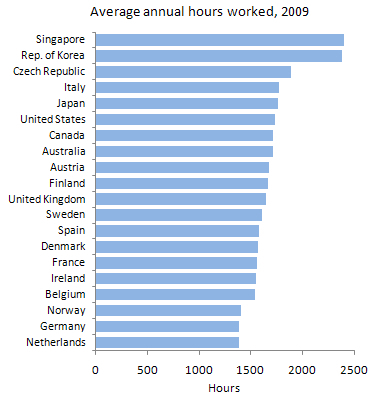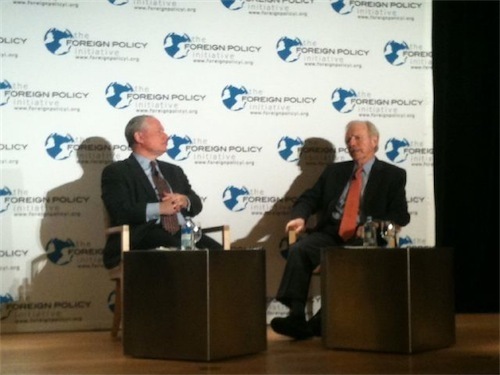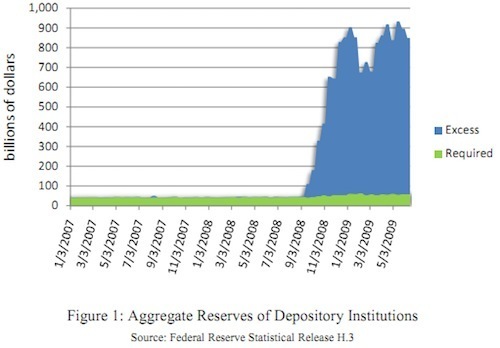Matthew Yglesias's Blog, page 2497
November 16, 2010
Florida GOP Tiring of Hispanic Support
Gabriel Arana did an interesting piece last week about the existence or lack thereof of a "Hispanic Vote." I think there mostly hasn't been such a vote in US history, though there's certainly a made-in-America Hispanic identity. He's right, however, that growing political assault on Latinos naturally breeds a kind of solidarity: "if there's a surefire way to make groups forget their differences and band together, it's to attack them, which is exactly what laws like Arizona's SB 1070 have done."
So I was interested to see that William Snyder will chair the judiciary committee in the Florida House:
The name is probably familiar to those who will recall that Snyder has already introduced an illegal immigration bill in the Legislature that he said would be the envy of those who are partial to what the state of Arizona originally attempted to do with its illegal-immigration legislation.
Snyder's bill was controversial even before it was discovered that it contains a provision that allows some individuals to be presumed to be legal in the U.S. if they can show proof of Canadian citizenry and or a passport from a "visa waiver" country, which means in most cases somebody from Europe. Citizens of those countries can visit for 90 days without having to obtain a U.S. visa., though they may be required to obtain a Homeland Security permit.">discovered that it contains a provision that allows some individuals to be presumed to be legal in the U.S. if they can show proof of Canadian citizenry and or a passport from a "visa waiver" country, which means in most cases somebody from Europe. Citizens of those countries can visit for 90 days without having to obtain a U.S. visa., though they may be required to obtain a Homeland Security permit.
Florida is an interesting place in these terms. The post-Castro Cuban exile community that moved there was very right-wing in foreign policy terms and gravitated to the GOP. That meant Florida conservatives were used to collaborating with members of an ethnic minority group, and the Florida Republicans had more success than Republicans elsewhere in getting other groups of Hispanics to vote for them as well. But even though (or perhaps because) immigration laws don't apply to people from Cuba, that community naturally reacts poorly to policy initiatives that appear to be grounded in ethnic prejudice. Marco Rubio, for example, is not a fan of Arizona's approach to immigration. But apparently the sub-section of the GOP that's historically been most successful at courting Hispanic voters is tired of all that.


Dutch Women and Part-Time Work
I'd long known the factoid that Dutch people generally do the least work of anyone in the world:
But I just today read Jessica Olien's explanation that this basically amounts to very few women working full-time rather than to Dutch full-time workers taking it easy: "less than 10 percent of women here are employed full-time … [l]ess than 4 percent of women wish they had more working hours or increased responsibility in the workplace, and most refuse extended hours even when the opportunity for advancement arises."
According to Nicole Bosch, Bas van der Klaauw, and Jan van Ours this is tied up with a number of familiar gender inequities. Women who increase their hours in the paid labor force don't find that their share of household work responsibilities falls. Consequently, lack of full-time work is closely associated with childbirth. But while these factors are obviously important drivers of women's labor force participation (or lack thereof), they're also hardly unique to the Netherlands. Instead, Dutch women seem to have somewhat different subjective perceptions of their household financial needs:
Furthermore, it seems that financial need for long working hours is less severe for Dutch women than for women in other countries. In the Netherlands, less than 40% of women indicate that they do not work less because of financial constraints. In other European countries, where many more women work full-time, over 50% of women say they do not work less due to financial constraints. It should be noted that due to part-time work, about 25% of working Dutch women earn less than what would be considered the minimum income for being financially independent.
This makes me curious about Dutch family structure. Do they have a much lower proportion of single women? It's worth noting that the Netherlands is among the richest countries in the world, with a GDP per capita a bit above America's in exchange rate terms and a bit below in PPP terms. They also have a more equitable distribution of income and higher-quality public services, so the median Dutch household is in fact more financially secure than the median household in pretty much any country. So to return to Olien's article, I think it would be a mistake to say that Dutch women are happy because so few of them are involved in full-time work. I would say instead that most Dutch women are happy because Dutch people enjoy an extremely high material standard of living (you should really see what passes for a slum in the Netherlands, it's absurd) and that this reflects itself in part via women's disinclination to toil for long hours in jobs they don't find rewarding.


Lieberman on Afghanistan
I wasn't able to attend Joe Lieberman's appearance at the neoconservative Foreign Policy Initiative conference this morning, but according to his Twitter feed while chatting with Bill Kristol he remarked: "We can't ultimately succeed in Afghanistan so long as the enemy has safe havens in Pakistan."
Obviously these two of the most war-happy individuals in the United States of America so they would never reach this conclusion, but isn't the obvious followup to Lieberman's theory of the case here that we can't ultimately succeed in Afghanistan? Of course Lieberman and Kristol are more likely to conclude that we should invade Pakistan. But if prevailing against a medium-sized band of poorly equipped irregular fighters requires a fundamental shift in the policy orientation of a large adjacent nuclear-armed state whose national security thinking is overwhelmingly focused on combatting the threat from India, then we've got a serious problem.
A more sensible take would be that we need to define objectives in Afghanistan that can be realistically achieved even if we assume that Pakistan will continue to be basically Pakistanish in the future.


Exquisite Chord
I've got a PinnaStorm post about Hole and the pathologies of mid-nineties rock and roll. It ends with a link to the Beastie Boys:
I find it endlessly amusing that Kathleen Hannah is currently married to one of the auteurs of "Shake Your Rump." Just saying.


Israeli Airport Security
One thing you hear all the time is that Israeli airport security is both more rigorous than American and also somehow less intrusive. The most recent version of that is making the rounds today.
I don't want to generalize too much from a single trip through Ben Gurion Airport, but I'd have to say that my experience leaving Tel Aviv was far and away the most unpleasant encounter I'd ever had with airport security officials in the decade. Moscow in 1998 was worse. As best I could tell, things went pretty smoothly as long as you were (a) Israeli, (b) traveling with an Israeli, or (c) traveling with some kind of well-established tour group. I think this may be how the majority of people go through the airport, which may account for its good reputation. But it took me approximately three hours to get from the initial passport check through to the food court. I was told that I couldn't take my iPad onto the plane, and therefore would have to check a whole bag that I'd been planning to carry on so that the bag could contain the forbidden device, and the same thing happened to two of the guys I was traveling with. Each individual item from the bad I was allowed to carry on had to be separately wiped down for traces of explosive residue and several items had to be wiped multiple times.
I was groped a couple of times, yelled at by surly Russian immigrants, accused of "lying" because I'd forgotten I had a second iPod charging cord in my bag, interrogated several times about who I'd talked to, etc.
What is true is that except for the Russian immigrants, who do bring the unique Russian approach to customer service, everyone is exceedingly polite. That said, the process took three hours! What's more, unlike with American security I actually felt somewhat threatened the whole time, like they might just decide I was too left-wing and destroy my laptop. Fortunately, I'd been warned this would likely happen and was delivered to the airport four hours before takeoff. But if you had to arrive four hours before your Atlanta-Boston flight's scheduled departure, then you'd vitiate the entire utility of air travel. I think the most sensible approach to airport security would be to simply accept a slightly higher risk that someone, somewhere might blow up a plane. Right now in the United States flying somewhere is orders of magnitude safer than driving their in a car. But it's become a huge pain in the ass. Reducing the "pain in the ass" factor would be a good idea.


Obama's Obsessive Focus
I assume the entire progressive blogosphere will agree with me that trying to pursue a more "bipartisan tone" in Washington is a substantively foolish idea for the White House to pursue. But the fact of the matter is that I think the smart thing for any President to say is that he wants to pursue a bipartisan tone, so it's hard to know what to make of that remark.
What I find more troubling is Obama's remark about his obsessive focus on policy in his first two years in office. Politicians say things that aren't true all the time, but what you really need to worry about is when they start believing those things. And this is the kind of self-pitying half-truth that I worry people in the White House actually believe, especially since the President said something similar to Peter Baker recently about how he "spent much more time trying to get the policy right than trying to get the politics right" and has learned that "you can't be neglectful of marketing and P.R. and public opinion."
It's of course true that you can't just totally neglect marketing, PR, and public opinion. But I think these kind of remarks reflect a fundamental misapprehension that's taken hold in some circles. The way this narrative goes is that the country was struck by a terrible economic crisis in late 2008. That crisis required measures that were unpopular but successful and the President is now paying the price for their unpopularity. There's some truth in all of that, but the more important truth is much more simple if economic conditions today we good or rapidly improving, then the President would be popular and his anti-recession measures would be seen as vindicated. But conditions aren't good, they're not rapidly improving, and the President isn't popular. What's more, whatever Obama was personally focused on "obsessively" it's just not the case that the policy outputs of the Obama administration reflect an obsessive focus on improving the economic situation. The American Recovery and Reinvestment Act was deeply shaped by a desire to avoid politically damaging accusations of waste, fraud, and abuse rather than shaped to get maximum stabilization bang for the buck. The administration forgot to appoint anyone to Fed vacancies for over a year. And the Affordable Care Act is providing zero (if not negative) short-term stimulus out of a politically motivated desire to achieve a deficit-negative 10-year CBO score.
I'm not going to pretend to be shocked to discover that there was politics happening in the American political system and not just an obsessive focus on policy. But political success and policy success are deeply intertwined in a recession, and a White House that thinks "too much policy focus" has been its big sin is unlikely to turn things around.


The Economics of OpenTable
Fascinating post from a restaurant proprietor hostile to the online reservation service OpenTable, who claims that the OpenTable cut on a restaurant check is approximately equal to 100 percent of the average profit on a meal. The pitch, obviously, is that joining OpenTable will reduce the excess capacity in your restaurant in increase average profit margins. The fear is that the cannibalization effect will dominate instead.
My take is that most restaurants operate with fairly inefficient pricing schemes, charging generally the same amount all seven days of the week. The promise of online reservations for the industry ought to be the ability to directly charge the consumer an extra "reservation fee" at times when tables are getting scarce.


Off to New Haven
Taking the supertrain (well, actually the regular train) up to New Haven today to speak at the Yale political union tonight. Blogging should continue apace, but a certain amount depends on the vagaries of iPhone tethering so you never know:
On the general subject of Yale, I learned a lot from listening to Robert Shiller's lectures and it's distressing to learn that Gary Gorton doesn't think the Volcker Rule implementation is actually going to work.


The NY Fed's View of Interest on Reserves
Reader RG sent me a link to a year-old paper from the New York Fed (PDF) which pretty clearly lays out the policy rationale for paying interest on excess bank reserves, and in the course of doing so helps explain why it's a mistake:
Paying interest on reserves breaks this link between the quantity of reserves and banks' willingness to lend. By raising the interest rate paid on reserves, the central bank can increase market interest rates and slow the growth of bank lending and economic activity without changing the quantity of reserves. In other words, paying interest on reserves allows the central bank to follow a path for short-term interest rates that is independent of the level of reserves. By choosing this path appropriately, the central bank can guard against inflationary pressures even if financial conditions lead it to maintain a high level of excess reserves.
This is to say that back in the summer/fall of 2008, the Fed saw the economy's problems as one of liquidity. So they created a lot of new liquidity. When doing so, they were concerned that this might lead down the road to out of control inflation. So they began paying a modest amount of interest on excess reserves in order to create a new tool that would allow them to engage in future monetary contraction by raising the rate. At the time, the theory was that the contractionary impact of the modest IOR payments would be more than offset by the beneficial impact of increased liquidity.
But here we are in the fall of 2010. Unemployment is high. Inflation has been running below target for almost two years, and market expectations are for it to continue to stay below target. So why not reduce IOR payments?


November 15, 2010
Endgame
I won't ask to come in:
— Revisiting this makes me curious as to why Greg Mankiw hasn't offered his take on this morning's pro-deflation letter from conservative pundits and economists.
— David Frum is way off the reservation.
— Josh Marshall is not a blogger.
— Important tax chart.
— Monetary policy comic book.
— I always forget that New Jersey lets mayors also be state legislators, which I think is a good idea.
Thao, "Bag of Hammers"


Matthew Yglesias's Blog
- Matthew Yglesias's profile
- 72 followers








